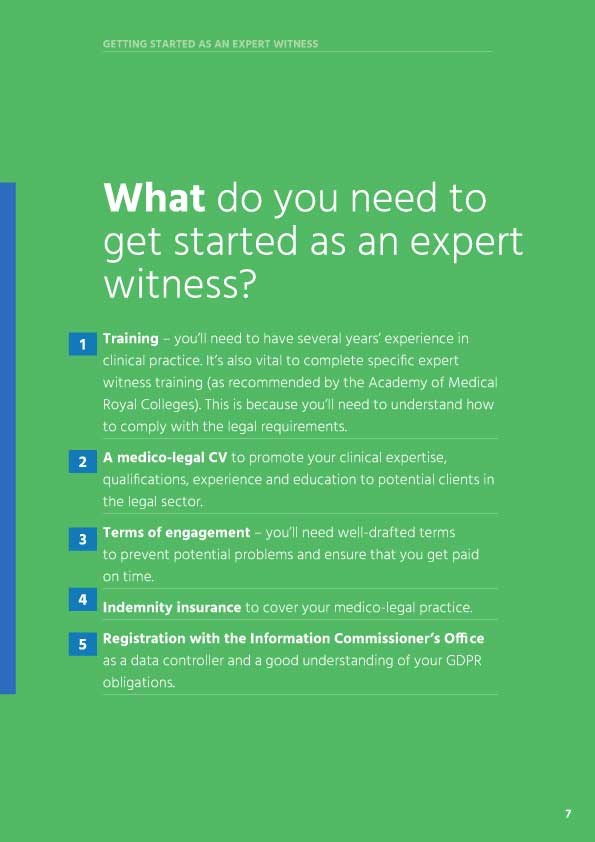Credible medical expert witnesses: the role, knowledge and legal obligations
Providing expert evidence in any legal proceeding is a professional privilege. Doctors can play an important role as expert witnesses in helping the Courts, tribunals or other dispute resolution processes make informed, fair decisions on cases involving clinical issues. A shortage of good expert witnesses means that doctors who are able to provide impartial and credible expert opinions are in demand.
Understanding the role of legal proof
An important part of being an effective expert witness is understanding the difference between scientific proof and legal proof. In any legal proceedings, the Court must make a decision based on the facts and opinions before it. Courts cannot sit on the fence, and Court decisions need not be based on scientific certainty. Doctors are trained to apply scientific certainty as the standard of proof. In comparison, legal proof is based on the balance of probabilities (more likely than not) in civil cases, and beyond reasonable doubt in criminal matters.
What does it take to be an expert witness?
The expert’s role
An expert witness must have specialised knowledge and skills based on their training, study or experience relevant to the matter at hand. Expert witnesses are also required to demonstrate to the Court that their opinion expressed in evidence “is wholly or substantially based on that knowledge”.
Legal obligations and mindset

Expert witness work is challenging, interesting and well-paid. And well-qualified clinicians who take on expert witness work are in high demand.
Join us for our introduction to expert witness work to find out what’s involved and how the litigation process works. We’ll delve into the legal rules governing expert witness work and look at how you can get started.
This webinar is aimed at medical professionals who are new to expert witness work.
Doctors acting as expert witnesses have an important duty in the legal system. It is not up to the expert witness to decide on the facts, as in what and how something happened. Neither is it up to the expert witness to decide on whether a doctor or party is ‘negligent’.
In summary, expert witnesses should:
- provide independent evidence to the Court
- assist the Court by giving an objective, unbiased opinion in relation to matters within their expertise
- never assume the role of an advocate
- state the facts or assumptions upon which their opinion is based and not omit to consider material facts which could detract from their conclusion
- make it clear when a particular question or issue falls outside your expertise
- indicate if you have changed your view on a material matter, for example, after reading the other side’s expert’s report. This should be communicated through legal representatives to the other side without delay and when appropriate, to the Court.
Making the time
If you are considering becoming an expert witness, it’s also important to have enough time to fulfil your duties. Thinking you can read instructions and provide an opinion in your ‘spare time’ may be overly optimistic. However, these tips should help:
- Medico-legal reports take time and they should not be rushed.
- Devote a portion of your working week to carrying out work as an expert witness.
- Do not take shortcuts.
- If you do not have the time to perform the work in the agreed time frame, say so. The legal team may be able to ask for more time.
Breadth of expertise
Should you decide to become an expert witness, it’s a good idea to perform work for both ‘sides’ – in civil cases, for the claimant and defendant, and in disciplinary matters for the regulator and the defence team. This will help you gain a breadth of experience.
Giving evidence: tips
Be prepared and form your opinion.
Thorough preparation is a key part of being a credible and confident expert witness. These initial steps will help you get started:
- Find out the date your report is due.
- Read the Civil Procedure Rules, Part 35
- Read all the documents and the questions and identify the main issues.
- You may be asked to assume certain facts and events. Distinguish between background history and assumptions of fact. Ensure that you get the facts and the assumptions correct, and in the right order.
- Do your research before you put pen to paper.
- Work out how you are going to explain your opinion and the reasons for your opinion.
- Know exactly where you obtained the information in the documents for your report as you will need to refer to this later.
- Challenge your opinion and conclusions – is your opinion consistent with the evidence base?
Develop clear reasoning
The reasons for any conclusions you reach and opinions you make must be clear. It’s important to link the facts and any assumptions to your opinion, and ensure a logical flow between them. Do not hypothesise about what may or may not have happened in a case. If there are any gaps in the sequence of events, check that you haven’t filled in any factual gaps with your own facts.
If you have any concerns about your opinion, for example, based on contradictory assumptions, address these before you write your report. It’s a good idea to call the lawyer who instructed you in the case to clarify your concerns and obtain more information.
If something is unclear, you may decide you need to give more than one opinion. For example, you could say, “I am unable to conclude from the documents and the assumptions provided that Dr Y warned the patient of… If he did, then my opinion is… If he didn’t, then my opinion is…”
Be clear about the limits of your knowledge, and don’t give an opinion outside your area of expertise.
Giving evidence

We’ve produced a guide for medical professionals which is packed full of useful information and tips to help you get started as an expert witness.
When forming your opinion as an expert witness, you should avoid a number of common traps.
Contradicting what’s in your report
Firstly, if the matter goes to Court, ensure that you read all the documents again, particularly all the references you have quoted. There is nothing more embarrassing than finding that counsel (or their expert) have read something you quoted that contradicts your own argument.
Outcome bias
Expert witnesses should be aware of the influence of ‘outcome bias’, which is a tendency to judge a decision on the basis of its outcome rather than on what factors led to the decision. Outcome bias can be avoided by focusing on what was reasonable at the time the event happened. The Court is interested in what was competent and reasonable practice, not what was best practice.
Advocating for the client
As an expert witness, it’s easy to fall into the trap of being an advocate for the client of the lawyer who engaged you. For example, “It’s easy to imagine that Dr X would have insufficient time to assess Mrs X’s history, discuss the ultrasound and also examine her”. This comment indicates that you are guessing what was in the mind of Dr X, and it could be interpreted as advocacy. You may think that a few comments can’t hurt, but as an expert witness, your key role is to provide an impartial opinion to help the Court to make an informed and fair decision. Courts do not take kindly to experts giving evidence which displays advocacy.
Landmark decision removes expert witness immunity
If you fail to take reasonable care in providing an expert opinion, you will generally not be liable for civil or criminal proceedings. However, a landmark decision of the Supreme Court has removed the protection for expert witnesses against law suits by people they had instructed to provide evidence on their behalf.
It’s important to be aware of your responsibilities and mindful that an expert witness can face disciplinary action for evidence given in Court, which is seriously flawed.
Inspire MediLaw’s Expert Witness Training covers all the issues above and more. Our training is facilitated by leading legal professionals, including Paul Sankey, Medical Negligence Lawyer from Enable Law, and barrister Dr Simon Fox QC, alongside experienced medical expert witnesses. Our training is accredited for CPD by the Royal College of Surgeons of England.
